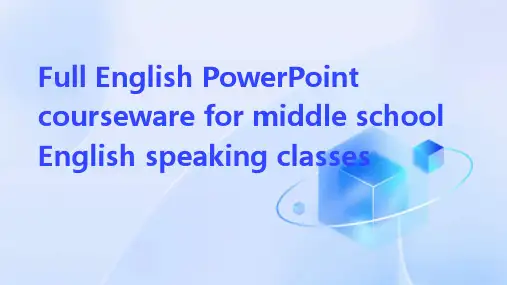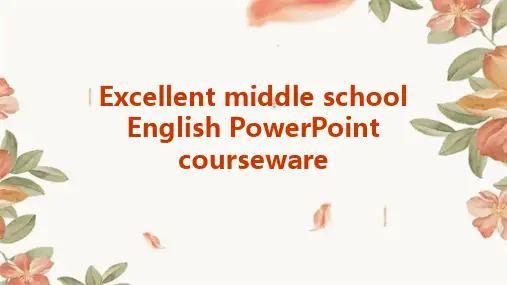初中英语课件ppt模版课件
合集下载
初中英语说课全英文ppt课件ppt课件

Regular tests, home work, and participation grades to monitor students' progress
02
Course Content
Course Structure
Welcome Page Course objectives and introduction
Vocabulary focus
Free time activities, travel and accommodation
Course Structure
Unit 6
Farewell and review
Grammar focus
Subjunctive and reported speech
Vocabulary focus
Language Fuovered include introducing yourself and others, describing daily routines, describing school life, ordering food in a restaurant, using public transport, describing hobbies and interests, making arrangements for meetings and travel, and expressing farewells
covers a range of topics to engage students in real life
situations and stimulate their interest in learning English
Multimedia Material
初中英语课件ppt免费

Regularly assess the listening level of students in order to identify and solve problems in a timely manner.
13
Oral expression strategies and imitation training
2
目录
2024/1/25
• Improving reading comprehension and writing skills
• Cultural background knowledge and expansion of cross-cultural communication skills
• Examination Skills Guidance and Preparation Suggestions
• Attributive clauses and adverbial clauses: Learn the guide words, word order, and usage of attributive clauses and adverbial clauses.
2024/1/25
11
03
Listening training and oral expression ability
Auxiliary materials
Provide rich listening, speaking, reading, and writing practice materials to help students consolidate their knowledge.
7
02
Basic knowledge of phonetics, vocabulary,
13
Oral expression strategies and imitation training
2
目录
2024/1/25
• Improving reading comprehension and writing skills
• Cultural background knowledge and expansion of cross-cultural communication skills
• Examination Skills Guidance and Preparation Suggestions
• Attributive clauses and adverbial clauses: Learn the guide words, word order, and usage of attributive clauses and adverbial clauses.
2024/1/25
11
03
Listening training and oral expression ability
Auxiliary materials
Provide rich listening, speaking, reading, and writing practice materials to help students consolidate their knowledge.
7
02
Basic knowledge of phonetics, vocabulary,
七年级英语课件ppt

语口语表达。
Final exam requirements
阅读理解
学生需完成一篇长篇文章并回 答相关问题,以检验其阅读理
解能力。
词汇与语法
进行词汇和语法的选择题、填 空题和改错题等测试。
写作
学生需写一篇命题作文,要求 结构完整、语言流畅、无语法 错误等。
口语表达
进行一对一的口语面试,要求 学生能够流利表达、语音清晰
题型特点
Reading comprehension(阅读理解)是一种常 见的练习题型,通常要求学习者阅读一段文本, 然后回答与文本相关的问题。
优点
阅读理解能够全面考察学生的语言运用能力,包 括词汇、语法、句型和语境理解等。同时,阅读 理解有助于培养学生的阅读兴趣和习惯。
应用场景
阅读理解适用于考察学生的阅读能力和理解能力 。通过阅读理解,教师可以了解学生对所学内容 的理解程度和应用能力。
04
Practice and consolidation
Multiple choice questions
题型特点
Multiple choice questions(选择题)是一种常见的练 习题型,通常给出一段文本或情境,然后要求学习者从几 个选项中选择最合适的答案。
应用场景
这种题型适用于考察学习者对基础知识的掌握情况,如词 汇、语法和句型等。通过选择题,教师可以快速了解学生 对所学内容的理解程度。
Enhance students' vocabulary and grammar
knowledge
Stimulate students' interest in English language and literature
Course outline
Final exam requirements
阅读理解
学生需完成一篇长篇文章并回 答相关问题,以检验其阅读理
解能力。
词汇与语法
进行词汇和语法的选择题、填 空题和改错题等测试。
写作
学生需写一篇命题作文,要求 结构完整、语言流畅、无语法 错误等。
口语表达
进行一对一的口语面试,要求 学生能够流利表达、语音清晰
题型特点
Reading comprehension(阅读理解)是一种常 见的练习题型,通常要求学习者阅读一段文本, 然后回答与文本相关的问题。
优点
阅读理解能够全面考察学生的语言运用能力,包 括词汇、语法、句型和语境理解等。同时,阅读 理解有助于培养学生的阅读兴趣和习惯。
应用场景
阅读理解适用于考察学生的阅读能力和理解能力 。通过阅读理解,教师可以了解学生对所学内容 的理解程度和应用能力。
04
Practice and consolidation
Multiple choice questions
题型特点
Multiple choice questions(选择题)是一种常见的练 习题型,通常给出一段文本或情境,然后要求学习者从几 个选项中选择最合适的答案。
应用场景
这种题型适用于考察学习者对基础知识的掌握情况,如词 汇、语法和句型等。通过选择题,教师可以快速了解学生 对所学内容的理解程度。
Enhance students' vocabulary and grammar
knowledge
Stimulate students' interest in English language and literature
Course outline
初中英语课件模版课件

Academic English
02
learning vocabulary that is specific to different fields of study, such as words used in science experiments or history reports.
Professional English
Easy-to-understand materials
Materials should be clear and easy to understand, with clear language structure and simple language expression. This can help students better understand the content of the speech and improve their listening accuracy.
名词规则
动词规则
形容词和副词规则
介词和连词规则
01
02
03
04
解释名词的复数形式、所有格形式等规则。
介绍时态、语态、虚拟语气等动词变化规则。
说明比较级、最高级的构成以及副词的用法。
分析常用介词的用法和常见连词的逻辑关系。
介绍如何根据语境选择合适的名词、动词、形容词和副词。
选择合适的词汇
Ask students to analyze, evaluate, and reflect on the text, encouraging critical thinking and analysis.
Gapfill exercises
Short answer questions
02
learning vocabulary that is specific to different fields of study, such as words used in science experiments or history reports.
Professional English
Easy-to-understand materials
Materials should be clear and easy to understand, with clear language structure and simple language expression. This can help students better understand the content of the speech and improve their listening accuracy.
名词规则
动词规则
形容词和副词规则
介词和连词规则
01
02
03
04
解释名词的复数形式、所有格形式等规则。
介绍时态、语态、虚拟语气等动词变化规则。
说明比较级、最高级的构成以及副词的用法。
分析常用介词的用法和常见连词的逻辑关系。
介绍如何根据语境选择合适的名词、动词、形容词和副词。
选择合适的词汇
Ask students to analyze, evaluate, and reflect on the text, encouraging critical thinking and analysis.
Gapfill exercises
Short answer questions
人教版九年级全册Unit1课件 (共25张PPT)

Are these habits good or bad? Why?
listening to music when learning
sleeping in class
talking with other students in class
They are not good habits for learning English.
1. What does “Practice makes perfect.” mean? Keep practicing. 2. If successful learners make mistakes, what do they often do? They learn from mistakes.
Read, study and learn about everything imporant in your life
Read Paragraph 3 and answer the questions.
Practicing and learning from mistakes Good learners think about what they are good at and what they need to practice more. Remember, “Use it or lose it.” Even if you learn something well, you will forget it unless you use it. “Practice makes perfect.” Good learners will keep practicing what they have learned, and they are not afraid of making mistakes. Alexander Graham Bell did not invent the telephone overnight. He succeeded by trying many times and learning from his mistakes.
listening to music when learning
sleeping in class
talking with other students in class
They are not good habits for learning English.
1. What does “Practice makes perfect.” mean? Keep practicing. 2. If successful learners make mistakes, what do they often do? They learn from mistakes.
Read, study and learn about everything imporant in your life
Read Paragraph 3 and answer the questions.
Practicing and learning from mistakes Good learners think about what they are good at and what they need to practice more. Remember, “Use it or lose it.” Even if you learn something well, you will forget it unless you use it. “Practice makes perfect.” Good learners will keep practicing what they have learned, and they are not afraid of making mistakes. Alexander Graham Bell did not invent the telephone overnight. He succeeded by trying many times and learning from his mistakes.
初中英语ppt优秀课件

listening and speaking abilities
Selection of teaching methods
Task based teaching
Design tasks based on the actual situation of students, guide students to complete tasks in groups, and cultivate students' autonomous learning and cooperative learning abilities
VS
Learning Needs
Attention is paid to the individual differences and learning needs of students, designing interactive and engaging learning tasks to stimulate students' interest in learning English and developing their autonomous learning abilities
Interactive link design
Interactive Questions
Design interactive questions based on teaching content, guide students to think actively, and enhance classroom interaction
practical exercises
03
Listening and Speaking Training
初中英语教学课件优秀PPT课件
man to reach the top of
Qomolangma.
Report time
R:Good morning,Eric. Nice to meet you! E:Good morning. Nice to meet you,too. R:We all know you're the first blind man to
the
longest deepest
mountain 山 river 河 desert 沙漠
in the world.
biggest salt lake
highest
咸水湖 freshwater
lake淡水湖
ocean 海洋
Qomolangma----the mhiogshttedsatngerous mountain in the world.
heavy storm
hard to tak
Read Para.2 and answer the questions.读第二段,回答问题。
1. How many achievements are mentioned(提及)? What are they?
in 1953 The first people-Tenzing Norgay Edmund Hillary
Always keep trying, 坚持尝试, Never give up, 永不放弃,
Never lose hope. 永不灰心.
No matCtehrawlhleant hgaeppyeonus,r无se论l发f生什么,
Just be brave, 只要勇敢面对,
in Btehleievfeaycouersoeflf, d相if信f自ic己u,lties !
Qomolangma.
Report time
R:Good morning,Eric. Nice to meet you! E:Good morning. Nice to meet you,too. R:We all know you're the first blind man to
the
longest deepest
mountain 山 river 河 desert 沙漠
in the world.
biggest salt lake
highest
咸水湖 freshwater
lake淡水湖
ocean 海洋
Qomolangma----the mhiogshttedsatngerous mountain in the world.
heavy storm
hard to tak
Read Para.2 and answer the questions.读第二段,回答问题。
1. How many achievements are mentioned(提及)? What are they?
in 1953 The first people-Tenzing Norgay Edmund Hillary
Always keep trying, 坚持尝试, Never give up, 永不放弃,
Never lose hope. 永不灰心.
No matCtehrawlhleant hgaeppyeonus,r无se论l发f生什么,
Just be brave, 只要勇敢面对,
in Btehleievfeaycouersoeflf, d相if信f自ic己u,lties !
Unit 1 课件(共35张PPT) 人教版九年级全册
1) It is no use/ good / useless + doing... 2) It is a waste of time + doing ... 3) It is fun + doing ... 在以上结构中常用动名词作主语。 It’s no use crying over spilt milk. 覆水难收。 It is fun playing with children. 和孩子们一起玩真好。
New words
Unit 1 Section A (Grammar Focus-4c)
repeat /rɪˈpiːt/
v.重复;重做
note /nəʊt/
n. 笔记;记录 v.注意;指出
pal /pæl/ n.朋友;伙伴 physics /ˈfɪzɪks/ n. 物理;物理学
chemistry /ˈkemɪstri/
A. playing B. to play C. play
Textbook
Unit 1 Section A (Grammar Focus-4c)
4a Match the questions and answers.
1. How do you practice speaking?
a. By watching English programs.
A. tell B. to tell C. telling
Grammar Focus
Unit 1 Section A (Grammar Focus-4c)
2. 用作宾语 1)作动词的宾语 常见的此类动词有:practise, understand, worry about, finish, give up, keep, keep on, look forward to, mind, miss, enjoy, depend on, cannot help, suggest, pay attention to, think about, succeed in, be used to, get used to, put off,等。
初中英语优秀ppt课件ppt课件ppt
Memory skills
Teach students some memory skills, such as associative memory, repetitive memory, etc., to help them memorize vocabulary more effectively.
Enhance text analysis skills
Present representative English text samples through PPT, guide students to analyze the language characteristics, rhetorical devices, and thematic ideas of the text, and improve their text analysis and appreciation abilities.
Basic English knowledge
02
Systematic learning
Show vocabulary roots, affixes, synonyms, antonyms, etc. through PPT to help students systematically learn vocabulary and improve their vocabulary.
Oral expression
Situational dialogue
English Reading and Writing
04
Developing reading comprehension skills
By presenting different types and difficulties of reading materials through PPTs, such as novels, news, science popularization articles, etc., students are guided to understand the main idea, details, and logical relationships of the article, and improve their reading comprehension and analytintext
Teach students some memory skills, such as associative memory, repetitive memory, etc., to help them memorize vocabulary more effectively.
Enhance text analysis skills
Present representative English text samples through PPT, guide students to analyze the language characteristics, rhetorical devices, and thematic ideas of the text, and improve their text analysis and appreciation abilities.
Basic English knowledge
02
Systematic learning
Show vocabulary roots, affixes, synonyms, antonyms, etc. through PPT to help students systematically learn vocabulary and improve their vocabulary.
Oral expression
Situational dialogue
English Reading and Writing
04
Developing reading comprehension skills
By presenting different types and difficulties of reading materials through PPTs, such as novels, news, science popularization articles, etc., students are guided to understand the main idea, details, and logical relationships of the article, and improve their reading comprehension and analytintext
优秀初中英语课件ppt
allow students to adjust interface colors, font sizes, etc. according to personal preferences to improve the user experience.
Moderate use
Animation effects can increase the fun of the course, but should be used moderately to avoid distracting students.
Clear navigation
02
Provides clear navigation menus and buttons, making it easy for students to navigate between different pages.
Personalized settings
03
Before role playing, teachers can provide students with background information and scenarios to help them understand the context and characters involved They can also provide language support and guidance on language usage
Gamified teaching is an innovative approach that integrates game elements into the classroom to make learning more engaging and enjoyable It uses the principles of game design to create a competitive and challenging learning environment
Moderate use
Animation effects can increase the fun of the course, but should be used moderately to avoid distracting students.
Clear navigation
02
Provides clear navigation menus and buttons, making it easy for students to navigate between different pages.
Personalized settings
03
Before role playing, teachers can provide students with background information and scenarios to help them understand the context and characters involved They can also provide language support and guidance on language usage
Gamified teaching is an innovative approach that integrates game elements into the classroom to make learning more engaging and enjoyable It uses the principles of game design to create a competitive and challenging learning environment
- 1、下载文档前请自行甄别文档内容的完整性,平台不提供额外的编辑、内容补充、找答案等附加服务。
- 2、"仅部分预览"的文档,不可在线预览部分如存在完整性等问题,可反馈申请退款(可完整预览的文档不适用该条件!)。
- 3、如文档侵犯您的权益,请联系客服反馈,我们会尽快为您处理(人工客服工作时间:9:00-18:30)。
3.T_u_r_n__o_ff_t_h_e_l_ig_h_t_s_w__h_en y_o_u__le_a_v_e_t_h_e_r_o_o_m__. __
4._D__o_n_’t_w__a_st_e_w__a_te_r_. __
_________________
5.__D_o_n_’_t _sl_e_e_p_t_o_o_l_a_te_._
Don’t eat in
classrooms!
Don’t listen to
music in the classrooms or the hallways.
Don’t fight.
h
2
An English song
❖ Can you swim? ❖ Yes,I can. ❖ Can you fly? ❖ No,I can’t. ❖ Can you sing? ❖ Yes,I can.I can sing well.
please.(Please be quiet.) (请安静。)
h
9
相关口令
• 祈使句无主语, 主语you常省去; • 动词原形谓语当, 句首加don't否定变; • 朗读应当用降调, 句末常标感叹号。
h
10
Grammar
祈使句
Example: 肯定祈使句
否定祈使句
1. Sit down. 2. Come in.
h
13
h
14
Don’t do your homework at school.
h
11
List the rules of the Fraster family.
• FAMILY RULES
1.Don’t talk loudly.
2._D_o_n_’_t _w_a_t_c_h_T_V______
_la_t_e_a_t_n_i_g_h_t ________
h
8
英语祈使句(Imperative Sentence)
•
定义:用于表达命令、请求、劝告、警告、
禁止等的句子叫做祈使句,祈使句最常用于表
达命令,因此在学校文法中也常称为命令句。
•
祈使句因对象(即主语)是第二人称,所
以通常都省略。祈使句的动词都为一般现在时,
句末则使用句号来表示结束。例:Be quiet,
Don’t sit down. Don’t come in .
3. Eat at home.
Don’t eat at home.
4. Listen to music outside.
Don’t listen to music outside.
5. 5. Do your homework at school.
(arrive) late for class this
❖ 2.We cannot (listen)to music in class.
❖ 3.
(not eat)in class.
❖ 4.What (be)the rules here?
❖ 5.Tom,
(listen) to me carefully.
Unit 12
h
1
Learning aims
• Master the key vocabulary:rule,hallway,classroom,fight,Ms
• Master and use:
Don’t
arrive late for class.
Don’t run
in the hallway.
h
3
h
4
1a Which rules are these students breaking? Write
the number of the rule next to the student.
SCHOOL RULES
1. Don’t arrive late for class.
2. Don’t run in the ays.
Peter _______2__
3 Selina _________
4 Nick _________
h
7
1c Pairwork
Student A, you are an exchange student. Student B , tell Student A about the rules above. Example: A: What are the rules? B: Well ,we can’t arrive late for class.
__________________
6._D__o_n_’t_e_a_t_a_n_d_r_e_a_d_a_t_the
_s_a_m_e__ti_m_e_._________ h
12
Fill in the blanks with the right form of the given words.
❖ 1.Who morning.
3. Don’t eat in the classrooms.
4. Don’t listen to music in the classrooms or the hallways.
5. Don’t fight.
h
5
5 4
3
1
h
6
1b Listen. What rules are these students breaking? Write the numbers after the names.
